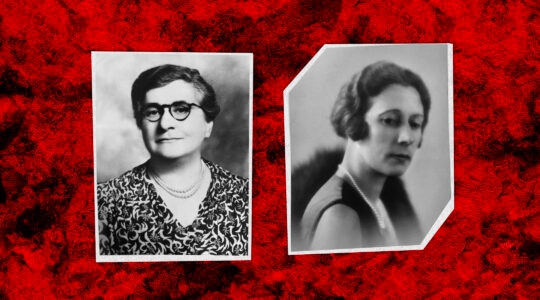When Peter Beinart took the The New York Times to call for a boycott of Israeli settlements in the West Bank, he stressed his own pro-Israel and Jewish bona fides:
More fundamentally, I am a committed Jew. I belong to an Orthodox synagogue, send my children to Jewish school and yearn to instill in them the same devotion to the Jewish people that my parents instilled in me. Boycotting other Jews is a painful, unnatural act. But the alternative is worse.
Well, just in case you didn’t believe him… here he is in Friday’s Wall Street Journal endorsing school vouchers for Jewish day schools:[[READMORE]]
… So how do Melbourne, London and Montreal maintain economically affordable, academically excellent Jewish schools? Simple: The government picks up part of the tab, often by covering the cost of the school’s secular subjects. If American Jews want our Jewish schools to flourish, we must push our government to do the same.
Doing so would constitute a radical shift. Outside the Orthodox community, American Jewish organizations have for decades opposed government funding for religious schools. The most common objection is that by intertwining church and state, such funding threatens religious liberty, a deep concern for a religious group that comprises roughly 2% of the U.S. population.
But that fear is overblown. Government aid to Jewish schools in Australia, Britain and Canada doesn’t mean that Jews in those countries enjoy less religious liberty than their American counterparts. Even in America, state and local governments already pay for the cost of special education in religious schools.
Non-Orthodox American Jews should worry less about whether the government will allow them to practice Judaism and more about why they and their children aren’t doing so. …
And if that wasn’t enough Beinart for you to digest during Shabbos… he also was butting heads in The New York Jewish Week with the newspaper’s editor and publisher, Gary Rosenblatt.
Two weeks ago, Rosenblatt dedicated his weekly column to a take-down of Beinart’s new book, “The Crisis of Zionism”:
I was hoping to see fresh reporting in the book, including conversations with young American Jews on campus and in communities around the country. Instead, we are presented with the findings of various surveys and polls on Jewish attitudes promoting Beinart’s positions. The book is a lengthy extension of his thesis that, as he writes at the outset, “if Israel fails” in the “struggle” between Zionism and liberal democracy, “it will either cease being a Jewish state or cease being a democratic one. Today it is failing,” he maintains, “and American Jews are helping it fail.”
His concern is well taken. Anyone who cares about Israel worries about the tension between its Jewish mission and its commitment to democracy. Some tend to overlook this argument, though, insisting that the onus for progress is on the Palestinians who have rejected Israeli peace offers without proposing any of their own, and who, many fear, are committed to a Mideast without a Jewish state.
But what is so frustrating is that Beinart, too, talks past the issue. He seems to view the Mideast crisis through the prism of the settlements as front and center — the very core of the Arab-Israeli conflict. He has little to say about the very real concerns of Israelis or about the history and context of a problem that goes back decades, if not centuries.
Beinart worries about raising children in America who will take pride in the Israeli flag, but where is his empathy for Israeli children surrounded by very real enemies and too often the victim of Arab hatred?
This past week, the Jewish Week published Beinart’s response:
Gary Rosenblatt thinks I’m a good guy but found my book, “The Crisis of Zionism,” frustrating. How appropriate, because I think he’s a good guy too, but thought his review did The Jewish Week’s readers a disservice.
Reviewers are supposed to analyze a book’s argument. Gary barely tries. He writes that “Beinart weakens his moral case by ignoring Israel’s security concerns.” Gary’s evidence for this assertion? He doesn’t offer any.
It’s simply not true that I ignore Israel’s security concerns. To the contrary, I detail the potential threats — from conventional attack, from missiles, and from terrorists — that Israel might face if it allowed a Palestinian state. I quote the noted Israeli military historian Martin van Creveld in explaining why the threat of conventional attack across Israel’s eastern front has declined. I argue that Palestinian security cooperation and the separation barrier — both of which have helped reduce Palestinian terrorism in recent years — are more sustainable over the long-term if Israel ends the occupation. I note that the vast majority of former heads of the Mossad and the IDF support a Palestinian state. I say that a Palestinian state clearly poses risks, but that the risk of a permanent occupation that forces Israel to choose between its Jewish and democratic characters is worse. I guess Gary missed all that.
Beinart also takes on Rosenblatt’s claim about the book being panned by “a wide range of Jewish thought leaders”:
Really? It’s been praised by New Yorker editor David Remnick, New York Times columnist Roger Cohen and noted philanthropist Edgar Bronfman, not to mention Bill Clinton. …
Wait, Clinton is a Jewish thought leader? In his book, Beinart says Obama is the Jewish president. Hold that thought.
… So who are the “wide range of Jewish thought leaders” that Gary has in mind? He mentions J Street’s Jeremy Ben-Ami. But Ben-Ami hasn’t panned my book; he hasn’t even read it. Yes, he disagreed with my op-ed calling for boycotting the West Bank and instead investing in democratic Israel, but even then he declared that “It’s critical for the Jewish community to hear Peter’s clear diagnosis of the problem Israel is facing.”
Which other “thought leaders” does Gary cite? He quotes Rabbi Ammiel Hirsch of the Stephen Wise Free Synagogue in Manhattan. But Rabbi Hirsch’s views aren’t exactly a surprise given that he’s publicly debated me twice. Finally, Gary offers two lengthy, and highly critical, quotes from the American Jewish Committee’s David Harris. What Gary doesn’t say is that my book criticizes Harris for, among other things, calling a West Bank without Jewish settlers “Judenrein,” and thus equating the relocation of settlers with the Holocaust.
Let’s replay this again. My book repeatedly criticizes David Harris. Gary then quotes Harris at length to support his claim that “Jewish thought leaders” dislike my book, all without revealing that perhaps one reason Harris dislikes my book is that it criticizes him. If one of my journalism students did that, he’d get an F.
Fair enough, but at least one more Jewish intellectual powerhouse, Tablet’s Alana Newhouse, has also panned the book. Writing in The Washington Post, Newhouse takes aim:
“The Crisis of Zionism” is most interesting when seen for what it is, at least in part: a political stump speech for an attractive young candidate who is seeking the job of spokesman for liberal American Jews. …
Beinart has many points in his favor: He is young but seasoned, he edited the New Republic, he is active in his Orthodox synagogue. It is easy to see why many younger Jews might prefer to see him featured on CNN as a Jewish spokesman in place of the balding men in suits or enraged Israeli consular officials who are often, by whatever baffling process, chosen to fill that role.
But after reading his book, I am sorry to say that I will not be pulling the lever for Beinart. This is may be surprising, since I heartily endorse many of his talking points about the moral and political corruption that the occupation has engendered — a position that, in fact, places us both among the vast majority of American Jews. Yet I cannot subscribe to the book’s fundamental thrust, which suggests something disappointingly problematic about Beinart’s campaign.
And about that Obama-is-the-Jewish-president thing:
But think hard about this: The impulse to involuntarily convert the president into a Jew is sweet but disturbingly tribalist, not to mention ultimately disrespectful of the background Obama does have. The president is not a Jew, just as Clinton was not our first black president. …
So why does Beinart try to put a yarmulke on the I’m-a-Christian-not-a-Muslim president?
The answer is that it allows Beinart to elevate himself as the standard-bearer of all good liberal citizens of America — Jewish or not — who want to think of Israel as a decent place but who can’t stomach the conflict with the Palestinians and who of course don’t want anyone to think they are anti-Semites, as indeed the vast majority of them are not.
Newhouse expresses sympathy with some of Beinart’s criticisms of the Netanyahu government and Israeli policy, but rejects the idea that the moral future of American Jewry is at stake or that American Jews can make Israeli leaders do what they don’t want to do.
In conclusion:
And so against what they see as the self-satisfied and delusional monolith of the American Jewish establishment, Beinart and his supporters are now erecting their own self-satisfied and delusional monolith, calculated to appeal to disillusioned Jewish summer camp alumni, NPR listeners and other beautiful souls who want the Holy Land to be a better place but do not have the time or ability to study the issues, learn the languages or talk to the people on both sides whose hearts have been broken over and over again by prophets making phony promises.
Here is what those people know: Peace will be made only by Israelis and Palestinians together, and when it comes, the American Jewish community will support it, as it has every effort toward peace in the past. American Jews will not save Israel, and Peter Beinart will not save American Jews. With “The Crisis of Zionism,” Beinart has indeed transformed himself into a spokesman for some. But in the process, he has ruined his chance to be a leader for many.
Did Newhouse just throw her hat in the ring? She already has Jeffrey Goldberg’s vote.
JTA has documented Jewish history in real-time for over a century. Keep our journalism strong by joining us in supporting independent, award-winning reporting.





